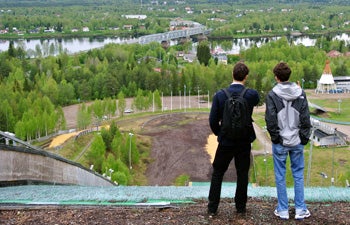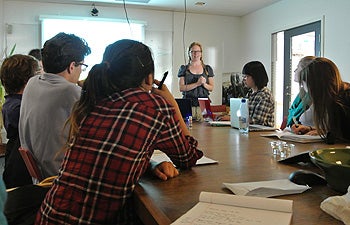North Pole Politics
The Arctic is the land of the midnight sun, ice-covered ocean and permafrost. Here, at the tippy top of the northern hemisphere, is a remote and beautiful landscape at the heart of a complex situation.
As polar ice caps are shrinking — an indicator of climate change — newly exposed access to oil and gas resources have spurred a mad dash for energy riches. With the region encompassing Canada, the United States, Norway, Finland, Russia, Sweden, Iceland and Denmark, territorial claims have ignited.
This summer, students enrolled in the course “Ecological Security and Global Politics” had the opportunity to explore these issues in the Arctic region. The class is part of USC Dornsife’s Problems Without Passports (PWP) program, which sends students across international boundaries to investigate complex societal issues.
“These are problems that the world faces that belong to no one country,” said Steven Lamy, professor of international relations, who co-taught the course with Robert English, associate professor of international relations in USC Dornsife. “In this particular case, there are a number of countries that see the Arctic as an important area in addition to the eight countries that are members of the Arctic Council. Countries outside the region like China, South Korea and Japan have indicated a keen interest in its governance.”
Under the guidance of Lamy, USC Dornsife’s vice dean for academic programs, and English, director of the School of International Relations, students travelled to Stockholm, Sweden; St. Petersburg, Russia; and Rovaniemi, Finland. In these locales they met with top diplomats, energy experts, scientists and leaders from environmental organizations such as the World Wildlife Fund, Greenpeace and the Baltic Fund for Nature, which are working to sort out the ecological and political issues at hand.
In Stockholm, the class met with Gustav Lind, Sweden’s Arctic ambassador and chairman of the Arctic Council — the preeminent intergovernmental forum for promoting cooperation, coordination and interaction among the Arctic States. Canada, Denmark (including Greenland and the Faroe Islands), Finland, Iceland, Norway, Russia, Sweden and the United States are members.

USC Dornsife students Reid Lidow and Joseph Beaudin stand overlooking the Finnish town of Rovaniemi, which sits right along the Arctic Circle. Rovaniemi is home to the University of Lapland, where the students met with researchers and scholars. Photo courtesy of Meghan Heneghan.
As a final project for the course, students were tasked with producing policy recommendations on an issue of their choosing. Reid Lidow, a junior studying political science and international relations, was part of a group formulating a recommendation for governing the Arctic.
“We drew heavily upon the interviews we had with various policymakers and experts,” Lidow said. “We were really lucky to have the opportunity to talk with very high-level people.”
Lidow and his group explored what the future of Arctic governance will look like — specifically, whether or not the Arctic is really being governed right now and if the Arctic Council will continue to be relevant.
“We came out of the program realizing that the Arctic Council — while in a lot of our readings didn’t seem to be a critical organization — is definitely an important body,” Lidow said. “Rather than starting from scratch and beginning anew with another body, what our group discovered was that there was a definite viability to current Arctic governance models. Not only that, but there is a past history in the Mediterranean region and other regions that trek along that same path.”
Students also met with ice scientists at the University of Stockholm, and Igor Neverov, the Russian ambassador to Sweden. In Russia, they met with Arctic and Antarctic scientists, experts at a mining institute, government and business officials from oil companies, and a university specialist on the indigenous peoples of the region. In Finland, they spent time with faculty at the University of Lapland and also met with Sami residents, the indigenous people of Lapland.
“Each day offered a unique perspective of a given city,” said Joseph Beaudin, who is studying policy, planning and development. “We were meeting with think tanks in the suburbs, entering governmental offices, eating lunch on university campuses. The program brought us to places that we would never otherwise visit.”
Beyond studying a complex problem that transcends international borders, the program offered students an opportunity to examine an issue that crosses disciplines.

At Greenpeace-Stockholm, USC Dornsife students meet with Dr. Therese Jakobsen, an expert on the Arctic. Photo courtesy of Meghan Heneghan.
Meghan Heneghan, a double major in international relations and cognitive science, is interested in environmental issues. This course was a perfect blend of her interests, she said.
“We were looking at an environmental concern through the lens of international relations. It was very appealing to me to see the political strategy behind things we all hear about like global warming and the melting of the ice caps,” Heneghan said.
In speaking with representatives from the World Wildlife Fund in Stockholm, Heneghan was fascinated by their realistic approach to protecting the environment while conceding that fossil fuel consumption is an integral part of lifestyles and economies.
“Even though in a perfect world there wouldn’t be any fossil fuel use or oil drilling and the Arctic would remain pristine, they understand that oil exploration is going to take place,” she said. “But, there needs to be the appropriate technology to deal with potential oil spills and other disasters that can take place while exploring.”
In addition to engaging in intensive policy research, students also got a chance to understand the Arctic in a way no textbook or Web site could convey. One side trip brought students to a village in Lapland, the largest region in Finland, where they spoke with indigenous cultural officials about preserving native languages and promoting sustainable tourism. There was also an impromptu cookout on the Gulf of Finland.
“I think it was important for the students to just stop working, stick their feet in virtual Arctic waters and see a little bit of the nature they were talking about in their seminars and books,” English said.
For international relations major Julia Mangione, opportunities like this are exactly why she chose to attend USC Dornsife. Mangione is writing a senior thesis on indigenous participation in the Arctic Council.
“We met phenomenal academics and researchers from the University of St. Petersburg, the University of Lapland and the Stockholm International Peace Research Institute,” she said. “Now I have contacts with all of these people. I can write them an e-mail and they know who I am. It’s really powerful to have those connections.”
Mangione admitted meeting with high-level officials could be stressful, but it was an incredible experience, she said.
“It definitely shows you how special it is to be a USC Dornsife student,” Mangione said. “I think if we hadn’t been from USC we wouldn’t have been given these types of opportunities.”